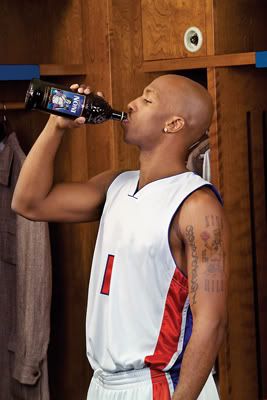Today's lesson in Economics 101
Chauncey Billups learned a lesson in economics today. Specifically in regard to the laws of supply and demand.
Here's "Supply and demand" defined: "Demand means the quantity of a given article which would be taken at a given price. Supply means the quantity of that article which could be had at that price."
In other words, the law of supply and demand means your price is going to go down when the supply is greater than the demand.
Chauncey Billups entered the free agent market as the best point guard available, and could be signed by any bidder. But the market for veteran point guards turned out to be minimal, especially after the NBA draft. The teams that needed PG's, got themselves PG's, at a price cheaper than the going rate for Billups.
 Unable to afford Cristal after signing his below market deal, Chauncey Billups celebrates his new deal by chugging a 40
Unable to afford Cristal after signing his below market deal, Chauncey Billups celebrates his new deal by chugging a 40The veteran PG market thus dwindled down to one team, the Detroit Pistons. The Pistons weren't about to get into a bidding war with themselves, and offered a below market contract to Billups, 5 years at $12 million per, $60 million in total. That's pretty much the same Pistons' deal that Ben Wallace turned down last year.
Billups, seeing the writing on the wall, agreed to the deal, according to DetNews.com and Chris McCosky.
I think the most telling line from McCosky about Billups' situation was this one...
"There apparently were no other serious bidders for Billups."
There was little demand for Billups' services. It looks as if the Pistons could pretty much name their price, and their price was $12 million a year.
Look at the contracts given to a pair of point guards that Billups is often compared to...
Jason Kidd's 6 year contract averages out to a little more than $17 million a year, signed in 2003.
Steve Nash's deal is 6 years at $11 million per season, and was signed in 2004.
Thanks to the NBA's laws of supply and demand, getting Billups for 5 years at $12 million, the Pistons got a steal. Would I have liked the deal to be maybe a year shorter? Sure, but the Pistons had to give Billups something in return for signing what should be considered a below market deal.
Postscript: I'm listening to WXYT right now, and Mlive's A. Sherrod Blakely says that Billups agent is refuting the report. The agent claims that they "Aren't even close" to a deal. Hmm, the plot thickens... Despite this news, if true, how much more could Billups realistically make, considering the market for him is down to one team?










If the article is wrong in claiming a deal has been signed then couldn't it be assumed that the 'no serious bidders' statement is false too?? It seems that the basis of your entry relies on that notion.
ReplyDelete